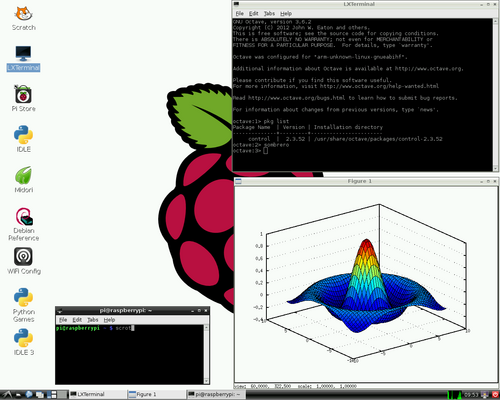Rasperry Pi: Difference between revisions
Jump to navigation
Jump to search
(added image from RaspberryPI running octave under LXDE and subchapter how to compile oct files) |
(The size of the package is no longer only 27MB, I checked 28/09/21 and it occupies 157MB) |
||
| (3 intermediate revisions by 3 users not shown) | |||
| Line 1: | Line 1: | ||
{{Warning|This article is outdated as of 2020-06-10; see [[:Category:Installation]] for latest information.}} | |||
[[File:Raspbian_wheezy_running_octave.png|500px]] | [[File:Raspbian_wheezy_running_octave.png|500px]] | ||
| Line 18: | Line 20: | ||
$ sudo apt-get update | $ sudo apt-get update | ||
$ sudo apt-get install octave | $ sudo apt-get install octave | ||
This will take some time to download (approx. | This will take some time to download (approx. 157MB) and install octave and all of its needed dependencies. After this there is an entry "Programming" - "GNU Octave" in your LXDE menu. | ||
| Line 36: | Line 38: | ||
After that you can compile your programs using "mkoctfile". See [http://www.gnu.org/software/octave/doc/interpreter/Oct_002dFiles.html#Oct_002dFiles GNU octave manual: A.1 Oct-Files] for how to write them. | After that you can compile your programs using "mkoctfile". See [http://www.gnu.org/software/octave/doc/interpreter/Oct_002dFiles.html#Oct_002dFiles GNU octave manual: A.1 Oct-Files] for how to write them. | ||
== | == libbcm2835 wrapper for GPIO == | ||
* Write a simple example which read/writes the GPIO ports from within octave. Here is a stub to start: https://github.com/octave-de/octave-rpi-gpio | |||
[[Category:Outdated pages]] | |||
Latest revision as of 17:36, 28 September 2021
This article is outdated as of 2020-06-10; see Category:Installation for latest information.
Raspberry Pi is a credit-card sized computer that plugs into your TV/Monitor and a keyboard. (see FAQ)
octave on Raspbian[edit]
The recommended OS is Raspbian “wheezy” and there are ready to use octave packages for that. You can check the available version with "apt-cache policy". As of 9.Jan 2013 this was:
$ apt-cache policy octave
octave:
Installed: (none)
Candidate: 3.6.2-5
Version table:
3.6.2-5 0
500 http://mirrordirector.raspbian.org/raspbian/ wheezy/main armhf Packages
Installing octave is really easy:
$ sudo apt-get update $ sudo apt-get install octave
This will take some time to download (approx. 157MB) and install octave and all of its needed dependencies. After this there is an entry "Programming" - "GNU Octave" in your LXDE menu.
octave-forge packages on Raspbian[edit]
If you type
$ apt-cache search octave-
you will see a lot of additional octave forge packages, for example
octave-control - control functions for Octave from Octave-Forge
Just install it with apt-get:
$ sudo apt-get install octave-control
build your own .oct files[edit]
sudo apt-get install liboctave-dev
After that you can compile your programs using "mkoctfile". See GNU octave manual: A.1 Oct-Files for how to write them.
libbcm2835 wrapper for GPIO[edit]
- Write a simple example which read/writes the GPIO ports from within octave. Here is a stub to start: https://github.com/octave-de/octave-rpi-gpio
